MercoPress. South Atlantic News Agency
Galician fishing industry recovering and investment in new vessels picking up
 This year companies have ordered the construction of 25 small, medium or large vessels, Fraga said in an interview at the recent Conexmar show in Vigo.
This year companies have ordered the construction of 25 small, medium or large vessels, Fraga said in an interview at the recent Conexmar show in Vigo.  The new vessels planned for this year, about one third were large trawlers, costing between €10 million and €30m.
The new vessels planned for this year, about one third were large trawlers, costing between €10 million and €30m. The Galician fishing industry is undergoing a boom as Spain recovers from the economic crisis that had caused a halt in the construction of new vessels and investments on new processing plants in recent years, Javier Fraga Diaz, director with Spanish bank Abanca's maritime unit (Banca Mar), revealed.
During the crisis that hit Spain the construction of new vessels had been “paralyzed”, but since last year “a lot of new projects” are getting approved.
“This year we have formalized, or we have under study, the construction of 25 small, medium or large vessels. If we follow this rhythm, there is no question that in 2018 we will remarkably surpass this figure,” Fraga said in an interview at the recent Conexmar show in Vigo.
He noted that, of the new vessels planned in 2017, about one third were large trawlers, costing between €10 million and €30m.
Fraga pointed out that falling oil prices in the last two years helped fishermen, as fishing costs decreased, but also encouraged investments in new vessels, as construction of ships for the offshore oil and gas sector slowed and shipyards partially lowered their costs to attract new business.
Galician ship owners, which “passed the crisis better than some in other sectors”, benefited from the fall in interest rates, fuel price, and bank facilitation, Fraga said, noting that Abanca's maritime unit saw the same in 2016 too.
Fishing companies realized “it was time to renew their fleet, which in some cases is very old, aged 30, 40 or 50 years,” Fraga said.
“This process, started in 2016, is increasing in 2017 and in 2018 we will exceed the 25 constructions of 2017,” he said.
Apart from fleet renewal, a rise in demand from global markets is pushing fish and seafood companies to invest in expanding their processing capacity, installing modern equipment, as well as building new cold storage facilities and warehouses.
“With increased demand from global markets, in 2017, companies emerging from the crisis realized they have to increase capacity. These investments in processing plants [started] this year. Steps are being taken both at the individual level and at an associative level,” Fraga said.
“At Conxemar several businessmen told me that they are studying the expansion of cold storage units and processing plants,” he added, pointing out that firms with a turnover between €50-€200m were mainly the ones planning investments at present.




Top Comments
Disclaimer & comment rules-

-

-

Read all commentsWhere are they going to fish if the UK's waters are closed to them ?
Oct 18th, 2017 - 06:47 pm 0I dunno Sassenach...
Oct 18th, 2017 - 11:02 pm 0But I know where they are NOT going to fish afer Brexit...
http://www.94diez.com/noticias/leer/12119-reino-unido-quiere-vender-cupos-de-pesca-en-malvinas.html
The Galician fishing industry is undergoing a boom as Spain recovers from the economic crisis.
Oct 19th, 2017 - 03:30 am 0http://en.mercopress.com/2017/10/18/galician-fishing-industry-recovering-and-investment-in-new-vessels-picking-up
The UK's waters are not closed to their money, so there!
Commenting for this story is now closed.
If you have a Facebook account, become a fan and comment on our Facebook Page!